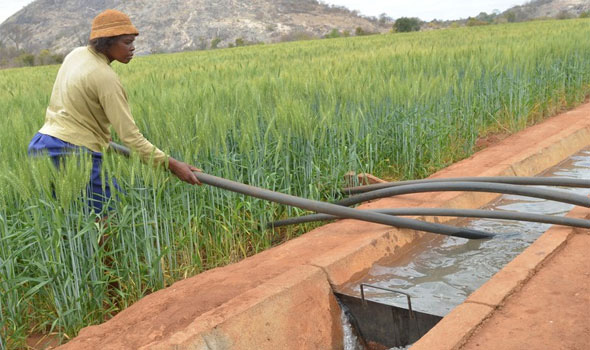Boost for Lower Gweru irrigation schemes
GOVERNMENT has unveiled an irrigation infrastructure development plan targeting three irrigation schemes in Lower Gweru.
The project implementation will see the Government availing new water pumping equipment to deal with water challenges at the irrigation schemes in Lower Gweru, which are Insukamini, Mkoba and Mbambanjeni.
The initiative has received development partner support and will see drip irrigation equipment being installed at each irrigation scheme to ensure access to water from Insukamini Dam throughout the year.
The three irrigation schemes are set to benefit from the new drip irrigation technology, which is expected to enhance improved production, job creation and food security. Of the three irrigation schemes, only Insukamini has been operational albeit on seasonal terms as activities upstream Gweru River, which supply the major dam, have affected water levels.
Midlands provincial irrigation engineer, Mr Shingirirai Zano, confirmed the development saying the infrastructural development in the three irrigation schemes will be done in phases. The budget for the programme has since been done and approved, he said.
“There is a massive irrigation infrastructure plan earmarked for three irrigation schemes in Lower Gweru this year to effectively deal with perennial water challenges in the area,” said Mr Zano.
“We are going to start with the Insukamini Irrigation Scheme where we expect the rehabilitation of the site to be completed in the first quarter meaning by April we will be done.
“The rehabilitation will see the introduction of drip irrigation, which is cost effective and saves water.”
He said from Insukamini Irrigation Scheme, they will then move to Mkoba before finalising with Mbambanjeni. “At Mbambanjeni there is more work since we need to purify the water, which is being polluted by the Gweru City Council,” said Mr Zano.
Vungu Constituency legislator, Omega Sibanda said functional irrigation schemes were key to sustaining livelihoods as the country moves towards achieving an upper middle-income economy by 2030.
“If you look at Lower Gweru and because of the three irrigation schemes we have, which are considered as self-sufficient, the people here have not been included in social welfare programmes,” he said. “That means we welcome any moves to rehabilitate these irrigation schemes so that they reach maximum potential for the socio-economic development of the area. We must be self-sufficient.”
Sibanda said he appreciated the important role played by irrigation schemes as he was also a beneficiary.-chronicle.clz.w









